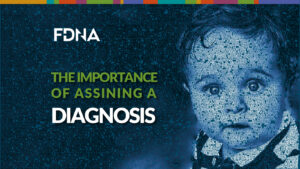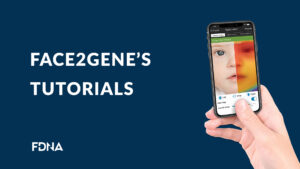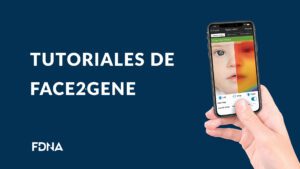Thanks to Face2Gene, doctors have an ally to make the diagnosis
Publish by ABC News (Spain). Read the original article here.
Recognizing the face of the disease is the idea behind Face2Gene. An application of facial biometrics to diagnose rare genetic diseases. Stefanie Eichner, a member of Face2Gene, confirms that “of the more than 7,000 known genetic disorders”, her company estimates that half are associated with a distinctive facial feature that can be learned and used for diagnosis. These physical traits are called ‘facial gestalt’, the recognizable physical pattern of a genetic syndrome. And not only would it be useful for the theme of rare diseases, but Face2Gene’s technology can help diagnose neurological and developmental disorders. And in the future, experts establish that it could also detect genetic errors, which lead to some types of cancer and autism.
“When you have a child who is different and you don’t have answers to give, and people look at you to ask you more questions, all you can say is ‘We don’t know.’ And then they leave.”
Mother of child with a genetic disease
This is an artificial intelligence that uses the patterns provided by the portraits to develop possible conclusions and provide a list of likely options. Because there are diseases that are identifiable on the face. And thus avoids the patient having to go through an odyssey for his or her diagnosis, often caused precisely by suffering from a disease difficult to recognize. This application in a few minutes allows, so to speak, ‘diagnose by the face’.
Eichner explains that Moti Shniberg co-founded Face.com, a facial biometrics platform that, as of 2011, recognized more than 18 billion faces on social media and the web. “After selling it to Facebook in 2012, Shniberg and Dr. Lior Wolf focused the powerful image analysis capabilities on one of the most important problems in healthcare and co-founded FDNA. Today, it is the AI-powered global leader to aid in the diagnosis of genetic and developmental disorders.
Antonio Martínez Monseny, paediatrician and clinical geneticist at SJD Barcelona Children’s Hospital who uses Face2Gene, explains that it is a free digital application to which you can register by having a corporate email from a health centre and which serves to help doctors and other healthcare professional who see patients with suspected rare diseases in their consultation.
Basically, it states that you have to enter a frontal photo, with the consent of the family or the patient, and then the platform screens the information. And it gives you a list of syndromes with similar values, in order, based on which ones have the best chance of being the right candidate. It is like an ordered differential diagnosis and serves in turn to train the clinical eye of the doctor.

Diagnostic Odyssey
Rare and ultra-rare diseases often attract little investment for drug research and studies, so Face2Gene is a powerful diagnostic ally. The European Union defines as rare any disease that affects less than 5 people per 10,000 inhabitants. 65% of those, according to the WHO, are serious and one in five patients suffers from chronic pain. And studies by the Spanish Federation of Rare Diseases (FEDER) indicate that the average time to access diagnosis in Spain is more than 4 years, and 20% can wait more than a decade.
Something similar happened to Keegan Battavio, a nine-year-old boy whom his mother began to detect that something was wrong. All the development milestones the children achieved as they grew up were delayed in Keegan, from speech to physical activities. The doctors his parents consulted didn’t come up with the correct diagnosis until they saw geneticist and doctor Karen Gripp, also FDNA Chief Medical Officar. Using the Face2Gene application, in a few minutes the results collated suggested that Keegan suffered from Smith-Lemli-Opitz syndrome, a developmental disorder that affects learning and behavior, and occurs in one in 40,000 people.
Another example available to FDNA is that of Glenn Maughan who took ten years to discover that he has KBG syndrome at the age of 12, and “was the answer to numerous questions that his parents, Annette and Glenn, had been asking for years: Why does he have so many seizures? Why is his gait so unusual? Can you hear us? Why did he start losing some of the early skills he had already acquired?” “Early diagnosis would have helped us a lot,” said Glenn’s mother, Annette Maughan.
At the age of 3 he had his first seizures, followed by another four in the following months. It was the beginning of countless consultations. Epilepsy and autism were considered until finally they found the answer: KBG syndrome, caused by a mutation of the ANKRD11 gene and is associated with developmental delays, cognitive disabilities, behavioral disorders, autism, seizures, hearing loss, skeletal abnormalities and cardiac complications. “When you have a child who is different and you don’t have answers to give, and people look at you to ask you more questions, all you can say is ‘We don’t know.’ And then they leave,” Annette told FDNA.
Montseny points out that he sees Face2Gene as especially useful for beginners doctors, pediatricians or geneticists to help them know and recognize genetic syndromes. “It’s faster than asking for an undirected global study. It helps you shorten the time to diagnostic suspicion and better direct your conclusions.”
Unbeatable in its genre
In that sense, Face2Gene’s strength for Eichner is that this first-of-its-kind platform helps researchers accumulate an ever-growing dataset. “Over the past ten years, FDNA has created a database covering 5000 disorders and diseases working with researchers, clinicians and geneticists. 1,500 of these can be detected using only our image analysis algorithms,” she says.
A Nature Medicine study shows that in 91% of cases, the correct syndrome was among the answers provided by Face2Gene. Montseny clarifies that it depends a lot on the quality of the photo, the age of the child and thirdly on how many striking features the child has. And last and very important, if the platform is trained to recognize that genetic syndrome.
Face2Gene is useful especially for children aged 5 years and adults. However, some genetic syndromes have been trained to recognize them in nursing babies younger than 2 years. In fact, Montseny was one of those who helped train the platform in this regard. And he points out that his database of all patient photos is not comparable to any other.
As the geneticist points out, it is also usefor for double diagnoses, children who have two genetic syndromes. “This is rare, but we have several patients in the hospital who are examples of this and Face2Gene helps recognize the second case.”
One step further
Added to this is a new Face2Gene algorithm introduced in February, which does not try to identify the specific disorder, but the similarity of a face with that of other patients suffering from the same disease. This was confirmed by the case of two children, one from Germany and one from Norway, that despite having different ethnic features their faces were similar. In this way, it was possible to use a facial algorithm to identify a specific condition when the training data available to the AI is small.
The AI creates an anonymized mask that is the sum of all patients with the same disorder, with the help of AI. However, Montseny adds that it would be ideal if it were an application that also allowed you to enter data from genetic studies, all in one or make family trees. “And if Face2Gene is so called because it goes from the face to the gene, it could also be applied not only to the face, but to the body, as if it were a ‘Physical2Gene’ to recognize other physical traits that can guide us,” he says.
In the end, applications such as Face2Gene show that with the help of technology, the phrase “the face is the mirror of the soul and the eyes, its interpreters”, becomes more true.


